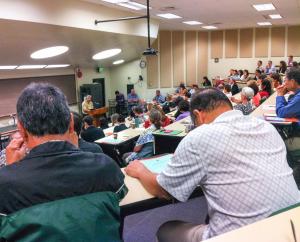2016 Access to Justice Conference explores urgent need for civil legal assistance
University of Hawaiʻi at MānoaAn outspoken former Chief Judge of the New York courts challenged judges and other leaders across the country to step up the fight to provide access to justice for thousands of people who, because of financial need, are left to represent themselves in civil court cases.
“The access to justice commitment can’t be apart from the leadership of the Judiciary,” retired New York Chief Judge Jonathan Lippman told an overflow crowd of 250 people at the eighth annual Access to Justice Conference hosted by the William S. Richardson School of Law at UH Mānoa on Friday, July 24. “This is our mission: Everybody gets their day in court . . . [and] the Judiciary should be at the center of this effort. We are the essential players.”
The 2016 conference brought together attorneys, judges, legal service providers and lay people to discuss ongoing challenges to providing legal representation for thousands of people who have no means to pay an attorney in civil cases that often involve basic needs, such as housing issues and parental rights. Also included on the day-long conference agenda were discussions about homelessness, landlord-tenant mediation, attorney training for self-help centers, affordable housing issues, implicit bias, and ceded land and quiet title actions.
In New York last year, Lippman emphasized, there were 1.8 million people unrepresented in court. That meant, for example, that in 96 percent of landlord-tenant cases, the tenants had no attorneys to assist them, while in 80 percent of foreclosure proceedings the individuals had no attorney.
“The biggest threat to people fighting for the necessities of life, who are literally falling off the cliff, is not being able to afford representation," he said.
When he took over as Chief Judge in New York in 2009, Lippman said that one of his commitments was to find ways to provide legal representation to those without financial resources. Through his efforts, and those of many business and banking leaders as well as lawyers, the New York Legislature this year allotted $100 million to enable legal service providers such as the Legal Aid Society to expand representation. The dollar figure grew from $12.5 million the first year, to $27 million, $40 million, $55 million, $75 million, $80 million, and now $100 million.
Just as he challenged the state to help pay the cost to provide legal assistance to the poor in civil cases, Lippman also challenged attorneys, as well as law students, to increase their pro bono (free) service.
Although pro bono service has increased significantly, according to Lippman, the need continues to grow. In New York, nine out of 10 people who come to legal service providers for help are turned away.
Hawai‘i has similar needs, Chief Justice Mark Recktenwald told the assemblage. But a series of initiatives spearheaded by his court, including self-help centers in every Hawai‘i county, and an increase in pro bono services by Hawai‘i attorneys, has been a resounding success. Just recently the National Center for Access to Justice ranked Hawai‘i third in the nation for its efforts, singling out the network of services including increased language access, disability access and self-help resources.
“But we can’t be complacent because we still have much to do,” said Recktenwald. “Thousands of people have to represent themselves because they can’t afford an attorney.”
Recktenwald also pointed out other successes so far, even though Hawai‘i’s Access to Justice Commission is just eight years old. “We have passionate people who care about this issue and are willing to devote time to serving others,” he added. “We have a great network of legal providers.”
Since 2010, when the Self-Help Centers were created with the assistance of volunteer attorneys, Recktenwald said 12,500 people have been helped. Additionally, the Medical-Legal Partnership for Children in Hawai‘i has assisted 500 people with legal issues in partnership with Kōkua Kalihi Valley Comprehensive Family Services, a community health center. The MLPC was founded by UH Law School graduate Dina Shek ’06, in collaboration with the UH Law School.
Retired Supreme Court Justice Simeon Acoba, who chairs the Access to Justice Commission, noted that Hawai‘i can look with satisfaction at the many strides it has made in serving the poor, including lobbying efforts to preserve the Indigent Legal Assistance Fund that will provide $1.3 million this year to legal service providers. And Acoba praised Hawai‘i’ for measures it has already undertaken. “This reminds us of the need for sustained commitment,” noted Acoba. “We must encourage even greater commitment.”
For more information, visit: https://www.law.hawaii.edu/

